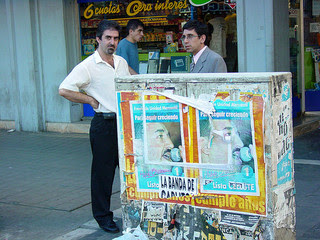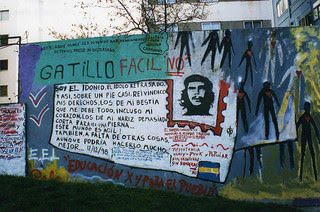 |
| Che is to Argentina what Güey is to Mexico Photo credit: Adam Jones licensed CC BY-SA 2.0 |
So what does it really mean?
This word could be used in any one of the three senses depending on the context; though largely interrelated, they have subtle differences in meanings only native Argentinean ears can catch out of nature. These three uses are:
- As the local Spanish equivalent of “hey” in English (like when you’d call the bartender’s attention for more Quilmes),
- As the local Spanish equivalent of “buddy” or “dude” in English (like when you have
- As a meaningless interjection, a conversation filler (like “er” or “you know” in English or este in Mexican Spanish)
As said above, che can also be employed as an informal conversation filler to assert comprehension, interest, or agreement. In this sense, common equivalents in English would be “well”, “so”, “right”, or even “er”.
The Guevara angle
 |
| Ernesto “Che” Guevara de la Serna Photo credit: Leonora Enking licensed CC BY-SA 2.0 |
So, if you ever happen to be in Argentina and wish to sound like them, you know what the first thing to do would be. Yes, say che each time you begin or end a sentence, pause in between, or call out to someone regardless of how far they are from you. Of course, you also need to master Spanish before you start sounding even remotely like them but che must still be an integral part of your vocabulary.
Origins of che
As interesting as mysterious is the story of che’s etymology which is still not very clear. It is quite possible that this word is drawn from the many South American Indian tongues. At least four indigenous languages are know to have che in their vocabularies; in Guaraní (meaning “I” or “my”), in Mapudungun (meaning “people”), and in Tehuelche and Puelche (meaning “man” in both).
Ancient Spanish is also known to have a word, ce, that was used in a vocative sense for calling out someone’s attention. Theories range from plausible (che being the shortened version of escuche meaning “listen”) to remote (che deriving from the Italian ciao meaning “bye” or cioe meaning “that is”).
Outside of Argentina
Now, time for some interesting trivia. The Argentine word, che has a distant European cousin that goes as xe and is widely used in Valencia as an expression of exasperation, surprise, or protest. The link between Valencia and xe is so strong that the Valencia CF is popularly referred to as the “Xe Team”! Xe also exists in the streets of Terres de l’Ebre in Catalonia.
Coming back to our good old che, it is also used in the Philipines, a former Spanish colony, with a slightly different connotation. Here, che is used when interrupting or dismissing a speaker, almost similar to “shut up” in English.
And for our friends in the Balkans, che is not different from re, which is a similar interjection in your part of the world with identical usage.



.png)
Hey vеrу nice blog!
ReplyDeleteFeel free to viѕit my websitе industrial safety consultant
Thanks for the feedback!
DeleteThanks for the feedback :)
ReplyDelete